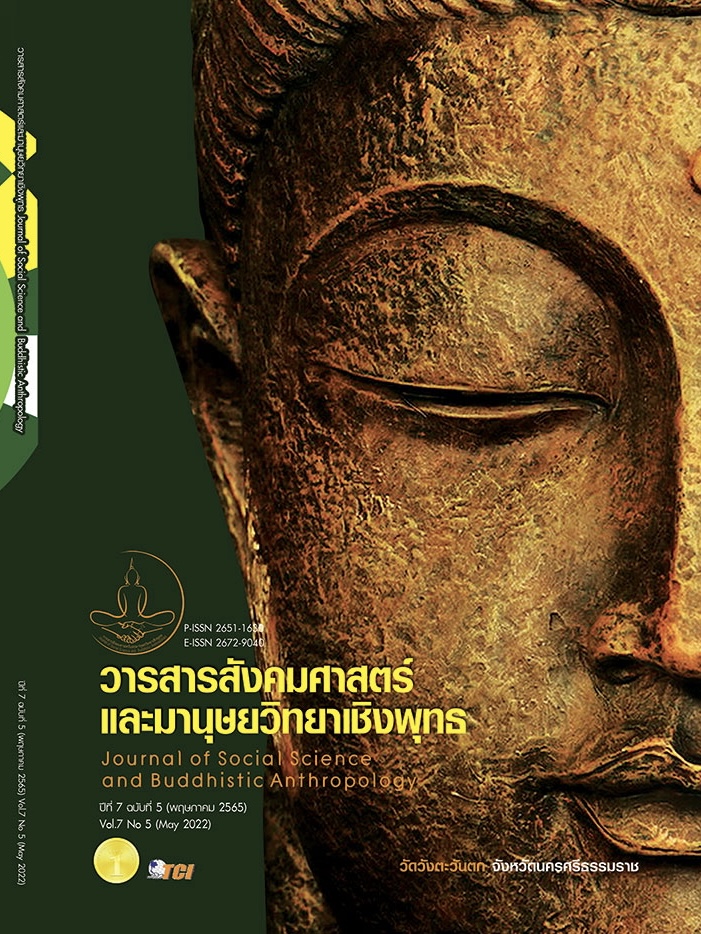THE DEVELOPMENT OF A TRAINING PROGRAM MODEL BASED ON TRANSFORMATIVE LEARNING THEORY TO ENHANCE MORAL PROJECT ADVISORY COMPETENCY OF MORAL TEACHING MONKS
Keywords:
Training Program Model, Transformative learning, Moral Project Advisory CompetencyAbstract
The objectives of this research were to 1) develop a training program model based on Transformative learning theory to enhance the moral project advisory competency of moral teaching monks and 2) study the results of experimental using of this developed training program model. This study is research and development conducted. 10 moral teaching monks were included by specific random sampling. The research tools were 1) The developed training program 2) The competent assessment forms for moral project advisor 3) Conclusion learning form 4) Writing a reflection form 5) Behavioral observation for advising of teaching monks and 6) Questionnaires. The difference in mean scores of the moral project advisory competency were analyzed by using Mean, Standard deviation and t-test for dependent samples data. The results of recent study revealed that the developed training program model based on Transformative learning theory to enhance the moral project advisory competency of moral teaching monks has 6 components 1) Principle 2) Objective 3) Curriculum structure 4) Training process that consists of 4 steps, namely, 4.1) confidence building 4.2) wisdom development 4.3) coaching practice and 4.4) Reflection to Change 5) Training materials 6) Evaluation and assessment). After using the training program model: 1) the advisory competency in the moral projects of moral teaching monks was significantly higher than before the training (p < .05). 2) The moral teaching monks who attended the training program received a cognitive score from the activities of all 7 learning units by passing the specific criterion. 3) The opinion of the moral teaching monks on the overall training course format was at the highest level ( = 4.52).
References
ชมนาด พรมมิจิตร. (2561). ปัจจัยที่ส่งผลต่อคุณภาพโครงงานวิทยาศาสตร์ของสถาน สังกัดสำนักงานคณะกรรมการการอาชีวศึกษา. วารสารรมยสาร, 16(3), 234-235.
ชูชัย สมิทธิไกร. (2556). การฝึกอบรมบุคลากรในองค์กร. (พิมพ์ครั้งที่ 8). กรุงเทพมหานคร: สำนักพิมพ์จุฬาลงกรณ์มหาวิทยาลัย.
ทัศนี ทิพย์คงคา. (2558). การพัฒนาหลักสูตรฝึกอบรมครูเพื่อบูรณาการจริยธรรมในการจัดการเรียนการสอนตามหลักสูตรแกนกลางการศึกษาขั้นพื้นฐานพุทธศักราช 2551. วารสารบริหารการศึกษา มศว, 12(22), 1-11.
ทิพวรรณ เดชสงค์. (2561). การวิเคราะห์องค์ประกอบเชิงสำรวจบทบาทการเป็นครูที่ปรึกษาโครงงานวิทยาศาสตร์ของนิสิตนักศึกษาครูวิทยาศาสตร์. วารสารวิชาการศึกษาศาสตร์, 19(1), 59-60.
ธารทิพย์ นรังศิยา. (2559). การวิเคราะห์โมเดลเชิงสาเหตุของความสำเร็จของการชี้แนะและการเป็นพี่เลี้ยงครู. วารสารอิเล็กทรอนิกส์ทางการศึกษา, 11(2), 235-250.
บุญชม ศรีสะอาด. (2556). การวิจัยเบื้องต้น. (พิมพ์ครั้งที่ 9). กรุงเทพมหานคร: สุวีริยาสาส์น.
พระเอนก บุญโยประการ. (2561). การพัฒนาหลักสูตรฝึกอบรมการสอนสำหรับพระสอนศีลธรรมระดับชั้นประถมศึกษาตามโครงการพระสอนศีลธรรมในโรงเรียนของกระทรวงศึกษาธิการ. วารสารการศึกษาและการพัฒนาสังคม, 14(1), 237-246.
พิมพ์พันธ์ เดชะคุปต์ และพเยาว์ ยินดีสุข. (2562). สร้างนวัตกรรมบนฐานการวิจัย PLC & Logbook. (พิมพ์ครั้งที่ 1). กรุงเทพมหานคร: สำนักพิมพ์จุฬาลงกรณ์มหาวิทยาลัย.
ภูมิพงศ์ จอมหงส์พิพัฒน์. (2564). การพัฒนาหลักสูตรฝึกอบรมเพื่อเสริมสร้างความสามารถในการจัดการเรียนรู้เชิงรุกของครูประถมศึกษา สังกัดสำนักงานเขตพื้นที่การศึกษาประถมศึกษาอุบลราชธานี. วารสารสังคมศาสตร์และมานุษยวิทยาเชิงพุทธ, 6(7), 334-349.
วิจารณ์ พานิช. (2558). เรียนรู้สู่การเปลี่ยนแปลง Transformative Learning. (พิมพ์ครั้งที่ 1). กรุงเทพมหานคร: เอส.อาร์.พริ้นติ้ง แมสโปรดักส์.
วิชัย วงษ์ใหญ่ และมารุฒ พัฒผล. (2562). การโค้ชเพื่อพัฒนาศักยภาพผู้เรียน. (พิมพ์ครั้งที่ 1). กรุงเทพมหานคร: จรัลสนิทวงศ์การพิมพ์.
ศูนย์คุณธรรม (องค์การมหาชน). (2562). 10 ปรากฏการณ์ คุณธรรมจริยธรรมในสังคมไทย. (พิมพ์ครั้งที่ 1). กรุงเทพมหานคร: 1924 สตูดิโอ จำกัด.
สำนักงานพระสอนศีลธรรม มหาวิทยาลัยมหาจุฬาลงกรณราชวิทยาลัย. (2563). รายงานผลการนิเทศติดตามการดำเนินงานโครงการพัฒนาโครงงานคุณธรรมส่งเสริมอัตลักษณ์วิถี
พุทธ. เรียกใช้เมื่อ 20 มกราคม 2563 จาก https://www.krupra.net/v3 /index.php?url=download&type_do=2
สำนักงานเลขาธิการสภาการศึกษา. (2560). แผนการศึกษาแห่งชาติ พ.ศ. 2560-2579. (พิมพ์ครั้งที่ 1). กรุงเทพมหานคร: บริษัท พริกหวานกราฟฟิค จำกัด.
สำนักพัฒนานวัตกรรมการจัดการศึกษา. (2562). บันทึกความสำเร็จโครงงานคุณธรรมเยาวชนไทย ทำดี ถวายในหลวง ปีที่ 13. (พิมพ์ครั้งที่ 1). กรุงเทพมหานคร: ศูนย์สื่อและสิ่งพิมพ์แก้วเจ้าจอม.
หฤทัย อนุสสรราชกิจ และญาณิศา บุญพิมพ์. (2562). การพัฒนากระบวนการผลิตครูในเขตภาคตะวันออกโดยใช้แนวคิดจิตตปัญญาศึกษาและการชี้แนะ. วารสารครุศาสตร์ จุฬาลงกรณ์มหาวิทยาลัย, 47(4), 487-505.
อิสรี สะอีดี. (2562). การพัฒนาหลักสูตรฝึกอบรมเพื่อเสริมสร้างสมรรถนะของครูพลศึกษาในศตวรรษที่ 21 โดยประยุกต์ใช้การอำนวยความสะดวกในการเรียนรู้ร่วมกับการสอนแบบเสริมศักยภาพ. ใน ดุษฎีนิพนธ์ครุศาสตรดุษฎีบัณฑิต สาขาวิชาสุขศึกษาและพลศึกษา. จุฬาลงกรณ์มหาวิทยาลัย.
Knight, J. (2009). Coaching. Journal of Staff Development, 30(1), 18-22.
Mezirow, J. (1997). Transformative learning: Theory to practice. New Directions for Adult and Continuing Education, 74(Summer), 5-12.
Onchwari, G. & keengwe, J. (2008). The impact of a mentoring-coaching model on teacher professional development. Early Childhood Education Journal, 36(1), 19-24.
Downloads
Published
How to Cite
Issue
Section
License
Copyright (c) 2022 Journal of Social Science and Buddhistic Anthropology

This work is licensed under a Creative Commons Attribution-NonCommercial-NoDerivatives 4.0 International License.









